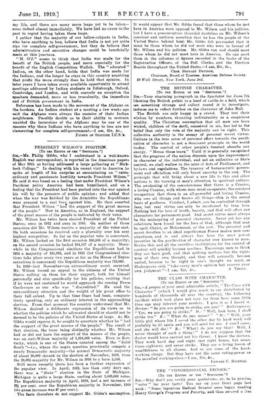PRESIDENT WILSON'S POSITION.
(To TRZ Rums or TIE " Ser.ccrsaoa."3
Set,—Mr. Philip Gibbs, who I understand is a well-known English war correspondent, is reported in the American papers of May 30th as having addressed a large gathering at " Birk- beck College." In dealing with his recent visit to America he spoke at length of his surprise at encountering an " extra- ordinary and passionate hostility towards President Wilson." He said it was based on a feeling that under President Wilson's Pacificiet policy America had been humiliated, and on a feeling that the President had been pushed into the war against his will by the pressure of public opinion; and added that when the war was finished by the Armistice the Republicans were aroused to a real fury against him. He then asserted that President Wilson " ha1 the support of the great masses of the people." Now in America, as in England, the support of the great masses of the people is indicated by their votes. Mr. Wilson has twice been elected President of the United States; once in 1912 and once in 1916. On neither of those occasions did Mr. Wilson receive a majority of the votes cast. On both occasions he received only a plurality over his next highest competitor. So far as the popular vote is concerned, Mr. Wilson lacked on the first occasion 850,504 of a majority; on the second occasion he lacked 244,147 of a majority. Mean- while in the Congressional elections the Republicans had in 1914 a majority of 345,883, and in 1916 (for Congressional elec- tions take place every two years so far as the House of Repre- sentatives is concerned) the Republican majority was 716,060. In 1918—last November—an extraordinary event occurred. Mr. Wilson issued an appeal to the citizens of the United States calling on them for their support, both for himself personally and also specifically for his policies, reciting that if he were not sustained he would approach the coming Pesos Conference as one who was " discredited." He used the extraordinary situation and the weight of his great office to their full extent. Up to that time there had been, compara- tively speaking, only an ordinary interest in the approaching election. From that moment the country understood that Mr. Wilson desired a deliberate expression of its views as to whether the policies which he advocated should or should not be deemed to be the policies-of the United States at large. As Mr. Gibbs would express it, he sought to ascertain whether he " had the support of the great masses of the people." The result of that election, the issue being distinctly whether Mr. Wilson had or did not have the support of the masses of the people, was an anti-Wilson majority of 1,194,568 votes. Even in Ken- tucky, which is one of the States counted among the "Solid South "—i.e., where the negro question practically compels a steady Democratic majority—the normal Democratic majority of about 30,000 shrank in the election of November, 1918, from the 28,076 majority for Mr. Wilson in 1916 to a bare 5,558.
Still more recently there has been a farther expression of the popular view. In April, 1919, less than sixty days ago, there was a "State" election in the State of Michigan. Michigan is quite a large State, casting about 1,000,000 votes. The Republican majority in April, 1919, had a net increase of III per cent. over the Republican majority in November, 1918 (its gross increase was 47 per cent.).
The facts therefore do not support Mr. Gibbs's assumption.
It would appear that Mr. Gibbs found that those whom he met hero in America were opposed to Mr. Wilson and his policies, but I have a preconception (founded doubtless on Mr. Wilson's constant and uniform assertion that he has the people of the United States behind him) Mr. Gibbs felt persuaded that it must be those whom he did not meet who were in favour of Mr. Wilson and his policies. Mr. Gibbs can and should meet those whom he did not meet here in America. He can meet them in the columns of figures recorded in the books of the Registration Officers, of the Poll Clerks, and the Election Boards throughout the United States—I am, Sir, die.,
CHAS. STRWART DAVUION, Chairman, Board of Trustee., American Defense Societe. 59 Wall Street, New York, June 3rd.






































 Previous page
Previous page